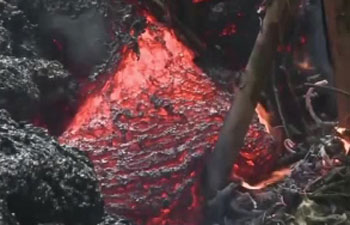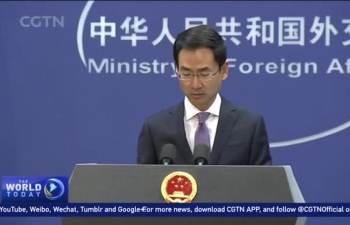WASHINGTON, May 13 (Xinhua) -- The European parties to the Iran nuclear deal have refused to accede to the United States and fix the deal signed in 2015 before the United States announced its exit, U.S. Secretary of State Mike Pompeo told local media on Sunday.
"We did try. The President set out a set of objectives. He tasked me in my first couple of weeks to work with the Europeans to try and do it, although the work had been ongoing before I arrived at the State Department," he said in an interview with CBS's Face the Nation.
"And at no time were we able to reach an agreement," said the top U.S. diplomat. "The Europeans simply wouldn't accede to the requirements to fix the deal."
"They had some 90 days to do so," he added, referring to U.S. President Donald Trump's threat to Europe in January that if it could not come up with plans to fix the "flaws" in the deal, Washington will exit immediately in May.
Trump announced the country's exit from the Joint Comprehensive Plan of Action (JCPOA) with Iran on Tuesday.
The JCPOA was signed between Iran and the five permanent members of the United Nations Security Council (China, the United States, Britain, France, and Russia) plus the European Union (EU) and Germany in 2015.
It froze the Iranian nuclear program in exchange for a gradual normalization of Iran's economic and political relations with the international community, and the end of sanctions.
Referring to the U.S. exit, Pompeo told Fox News on Sunday that "we couldn't reach an agreement with our E3 partners," namely Britain, France and Germany.
He said the U.S. "sanctions regime that is now in place is very clear about what the requirements are," hinting that Washington is prepared to go after European companies and allies if they continue to do business with Iran.
U.S. Secretary of the Treasury Steven Mnuchin said last Tuesday that "sanctions will be reimposed subject to certain 90-day and 180-day wind-down periods. At the conclusion of the wind-down periods, the applicable sanctions will come back into full effect."
French Finance Minister Bruno Le Maire later responded that Europe should not accept the United States' playing the role of the "world's economic police," or become U.S. "vassals" that "obey decisions taken by the United States while clinging to the hem of their trousers."
Despite the escalating trans-Atlantic tensions, Pompeo said on Sunday that Washington will continue to work with Brussels to work on a new deal.
"I'm hopeful in the days and weeks ahead, we can come up with a deal that really works, that really protects the world from Iranian bad behavior, not just their nuclear program, but there missiles and their malign behavior as well," he said.
On the Iranian side, President Hassan Rouhani said on Sunday that Tehran will adhere to the international nuclear deal if the country's interests are secured by other parties to the agreement.
"If the remaining five countries in the deal live up to their commitments and guarantee Iran's interests, the agreement will survive," he said during a meeting with visiting Sri Lankan President Maithripala Sirisena.













